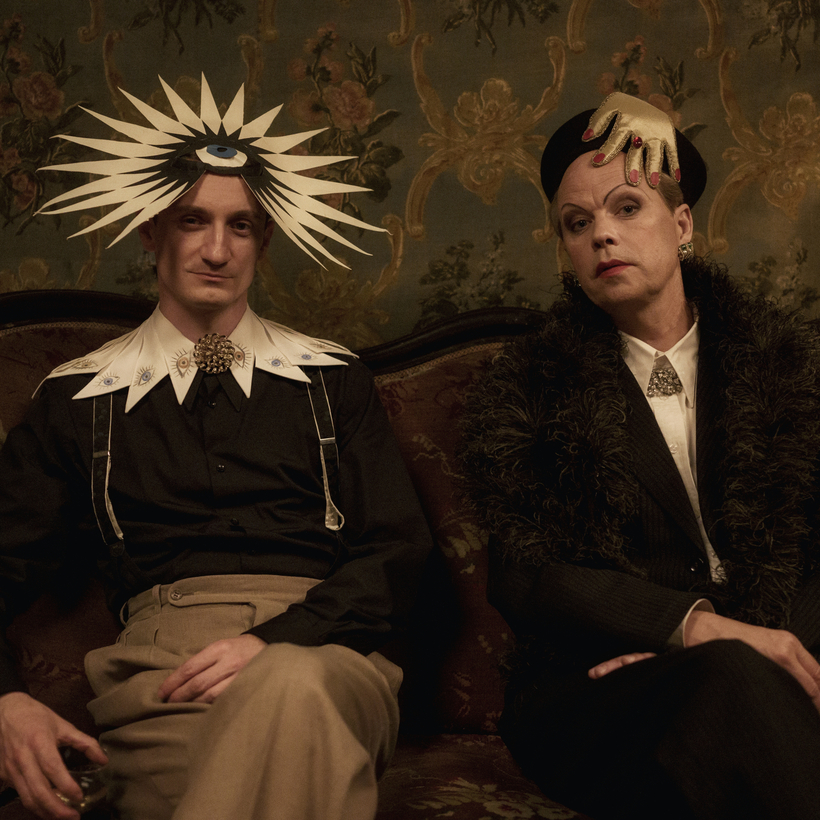Catharsis seekers, you’re in luck. The new black comedy Transatlantic, which closed out the Séries Mania festival in Lille on Sunday, debuts on Netflix on April 7. Set in Marseille in 1940, it’s inspired by the true story of Varian Fry, an American journalist; the American heiress Mary Jayne Gold; and their Emergency Rescue Committee, a pokey little NGO to help refugees escape the Nazi occupation, including some of the most well-known artists of the day, such as André Breton and Max Ernst, who were on Nazi blacklists. Transatlantic is the latest series from Anna Winger, of Deutschland 83 (and 86 and all the rest) and, more recently, Unorthodox, which debuted on Netflix in 2020, approximately one week after we all went into lockdown. If you can recall back then, 3,000 years ago, the limited series about a woman escaping a claustrophobic ultra–Orthodox Jewish community for the wide-open artistic freedom of Berlin was very popular—the first series that merited the extra time we all had on our hands. It was wonderfully emotional and well done, and since it was about escaping confinement of a different sort, well, no wonder it resonated.
Winger had been working on the show for almost two years before it aired. The plot material and the historical moment were serendipitous. The same is true of Transatlantic, which was in development for three years before the Ukraine war broke out and now airs as more than eight million Ukrainians have fled their homes.

Winger is not trained as a current-events Sibyl, but, as the child of anthropologists who moved her around the world throughout her youth, she resonates with such themes as creativity in displacement. A professional documentary-and-fashion photographer, she moved from New York to Berlin, in 2002, for love—she is married to the German TV producer Joerg Winger—and then had to re-invent her creative life when she became pregnant.
She had never tried writing before, but she caught the bug, and the result was a novel, This Must Be the Place, published by Riverhead. It’s about a fading German voice-over actor who dubbed Tom Cruise for decades. Next, she started to write episodes of Joerg’s TV show, a police procedural called Leipzig Homicide, whose rigid plot structure she found liberating.

Deutschland 83 was her idea, based on anecdotes from Joerg’s compulsory military service, right before the wall came down, at a listening post spying on East Germany. “This is a comedy,” she told him. “If you think so, go write the pilot,” he replied.
That was 2015, when TV shows were still rigidly segregated by country and language, and Winger couldn’t write in German. “Nobody would take me seriously except my own husband,” she said. But because the pitch deck was in English, and it was funny and poetic, it found a home on the Sundance Channel before it was sold domestically, making it the first German series to go international.
The streamer revolution, with its cheap A.I.-generated subtitles, broke right after. Suddenly the world got even more curious about dramatic content from other countries, much cheaper to produce than American shows. And since Netflix and Amazon’s executives tended to speak only English at the time, Winger offered the perfect bundle. “I wouldn’t have a career if it weren’t for that,” she says. “It’s a big giant experiment with the streamers internationalizing content in a way that never was this internationalized before, which I think is exciting and amazing.”

With the success of the Deutschland series,Winger set up her own production company, Studio Airlift, in Tempelhof in 2016, an all-woman-led shop focusing on content based on true events. “I’m not interested in making stuff up about the future,” she says. “I feel like all the science fiction I need is in history and the things that are happening under our nose. You can’t make this shit up. There’s just so many weird things happening in real life.”
Now Airlift has an overall deal with Netflix, and in addition to developing and writing her own series, Winger has served as a consulting producer on two other highly international properties, Epix’s Berlin Station and the Apple TV mini-series Suspicion.
“Nobody would take me seriously except my own husband.”
“When you’re writing about the past, you’re really writing about your own life and contemporary events anyway,” Winger says. Like Winger herself, Transatlantic is an organically cosmopolitan story, both in its subject matter and its production team, including a Nigerian—the second-in-command of the writers’ room—and a French-German-and-American cast that includes Gillian Jacobs (Love), Grégory Montel (Call My Agent!), Jonas Nay (Deutschland), Louis-Do de Lencquesaing (Engrénages), and Corey Stoll (Billions).
“The cultural friction kind of helps us to get to something original,” Winger says. “Everybody pushes through to something that they couldn’t have done on their own.”
“Transatlantic is about the most sophisticated people in Europe stuck at the edge of the world,” she says, ticking off characters like André Breton, Max Ernst, Walter Mehring, and Walter Benjamin. “Some had no life skills for this. Others had already fled Germany years before and settled in Paris peacefully, and thought they were now together and safe and could do their work, and then the Nazis showed up. So they’re at the end of their tether.”
War and migration aren’t just the adrenaline of terror; it’s also boredom and waiting, and bonding and sex and the silliness that anyone who has lived through a time-stopping traumatic situation can relate to.

The show has the lightness and loopiness of Billy Wilder and Ernst Lubitsch to let you reflect on the last European genocide as a metaphor for the current European genocide without wanting to drown yourself in the bathtub. (The episode that depicts Max Ernst’s birthday party, with guests in D.I.Y. Surrealist costume, and an opportunistic Peggy Guggenheim gathering up as many artworks as she can, is a particular highlight.)
“Casablanca was written when the war was still going on,” Winger says. “And there were all these European émigrés coming to Hollywood who were suffering and processing their feelings through humor. We are not saying that this wasn’t incredibly scary and awful. It’s nobody’s idea of adventure to be a refugee, right? But we’re using the tools of the era to see us through it.”
The Marseille location provided its own challenges, since the seaside city was so heavily bombed and then rebuilt just a few years after Transatlantic takes place. But it had the grit the show needed. “Marseille hasn’t been sanitized like Paris, where everything looks perfect,” she says.
A nearby villa where the Emergency Rescue Committee sets up shop after their portside hotel is raided also served as the production office, and it didn’t have indoor plumbing. “We had to put up scaffolding under each floor where we shot because we were worried it’d cave in.” Europe!
“We are yet again, unfortunately, living in a time of great upheaval,” Winger says. “It’s no surprise to me that Surrealism is back.”
Alexandra Marshall is a Writer at Large for AIR MAIL. A contributor to W, The Wall Street Journal, Vogue, and Travel + Leisure, she recently relocated from Paris to Le Perche

